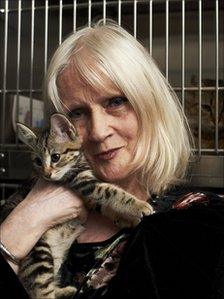Why do some women devote their lives to saving cats?
- Published
If a dog is a man's best friend, the stereotype is that cats tend to endear themselves more to female pet owners. But some women go further, giving their lives to the care of cats. Why?
Ancient civilisations may have worshipped cats, but from the black cat on a witches' broomstick to the image of a spinster who has substituted any hope of a husband with a cat, the female's relationship with felines has sometimes been regarded as slightly suspect.
Yet for some women, giving cats a home is a lifetime pursuit.
Pat, a pensioner, has always taken in stray cats and says she is particularly drawn to the old, sick and unwanted ones.
"I don't know why I love animals so much. Perhaps it was my upbringing. My dad was a bully... bullied my mum and he used to drown kittens," says the 71-year-old from Dagenham, east London.
"I used to have to watch - I was only a tot looking over the sink and all these kittens were going in a cocoa tin. I never forgave him for it."
Other men in her life have often been no better.
"The last bloke was a drug addict, he used to beat me to a pulp. Maybe that's why I like animals. I feel so sad because people are so cruel [and] don't think animals have feelings."
Bogged down
Pat had accumulated about 20 cats when it became known locally that she was a rescuer. Then it got "big... too big".
"Twenty was easy, believe you me, compared to what I've got now," she says, as a clutter of cats, and the odd dog, pad their way around her living room and kitchen.
But the responsibility of being a sort of Florence Nightingale figure to the stray feline population can weigh heavy on her.
"I felt very down yesterday, I woke up and thought I've got a lot of cats. I don't know how many. I'm so bogged down. I haven't got a life that I want. I love my cats, I love them all, but I suddenly thought 'oh my god what have I done'? I'm like a nervous wreck now, I want to run away from it."
Yet Pat is by no means alone in her desire to help, and her apparent over-reaching of ambition.
Cats Protection, a cat welfare charity, says a sample from the last four years shows that out of the 35,335 cats adopted from their centres, 25,510 cats were adopted by women on their own.
Plenty of well-intentioned women - and it tends to be women because they "have a stronger nurturing instinct than men" - have been down this path, says Dr Roger Mugford, an animal psychologist who runs the Animal Behaviour Centre.
Homes start to smell
"They get excessively concerned about rescuing animals, fill up their houses with cats. It can often become overwhelming."

Former model Celia Hammond has dedicated her life to animal welfare
"Before they know it they have 100 cats, mounting bills, cats defecating in the house, infectious diseases like cat flu. Their homes start to smell, visitors stop coming, it gets isolating, stressful and they run out of financial resources."
It hasn't got to that stage with Celia Hammond, whose face once graced the cover of Vogue magazine during her former career as a model in the 1960s.
She has been rescuing, neutering and re-homing stray and unwanted animals for decades. She has set up two London clinics to help struggling pet owners with low-cost neutering, vaccinations and treatment.
But unlike her previous vocation, this is not a job one can switch on and off, she says.
"It's very hard to do this job and have a normal life. Relationships just fall apart, I've had three main ones and I neglected all of them which is why I'm on my own," says Ms Hammond, who has sometimes ended up working 22 hours a day helping cats.
Prolific breeders
"In a way the whole thing was upsetting, but it was also a relief because I didn't have to answer to anybody anymore. The thought of being alone when time goes on is a little bit scary sometimes, but not really."
And it doesn't seem like her workload will ease up any time soon.
The problem, in the capital at least, is getting worse according to the RSPCA. It received 8,455 reports of abandoned cats between January and the end of September this year, compared with 5,945 during the same period in 2009.

Celia Hammond was a top model in the 60s and regularly appeared on the front cover of Vogue
"Take one female cat over a seven-year period. If all the kittens survived and bred, she would be responsible for 21,000 cats - they are such prolific breeders you can see how important it is to neuter," says Ms Hammond.
"We've had as many as six or seven litters dumped here in a day, thrown out in boxes in skips. The worst is when they are thrown down the rubbish chutes, it is just so terrible.
"It's only really this year that we've felt that we're actually slipping backwards and not going forwards. I've never felt so helpless."
Ms Hammond says her modelling days feel so far removed from her life now. It was like it was a different person.
"You only get one life, you have to do what you feel is right with it.
"If you have a lifestyle where you have spent your whole life taking drugs, going to parties, flying all over the world and lying on the beach, what would you feel at the end of your life?"
Wonderland - Mad Cats And Englishwomen will be broadcast at 2100 BST on BBC Two on Wednesday 27 October. Or watch afterwards on BBC iPlayer.